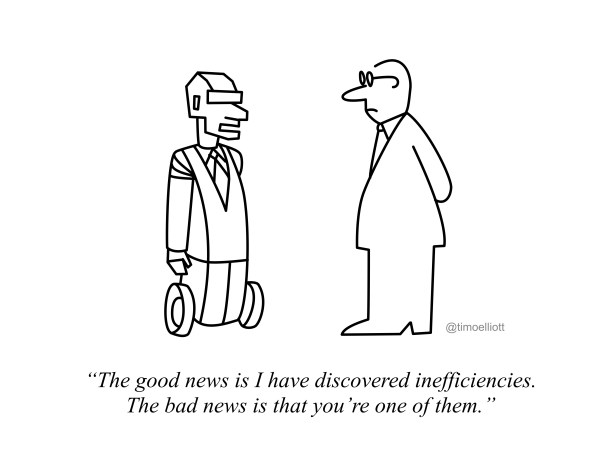A while ago, one of my colleagues asked me if I could give her some references about the “threats” of artificial intelligence (AI). It was a pleasure to share thoughts and materials about the so-called dark side of this unprecedented phenomenon. However, as someone who is into AI and smart technologies and usually thinks about their potential and beauty, it made me think more in-depth. In fact, it reminded me of an executive manager in my country who happened to be an academic professional, too:
Two years ago, labor robots appeared in the market that assisted personnel in moving boxes in the warehouse. He refused to buy the robots, as he was not sure how they would impact productivity and was concerned about the potential side effects. A few months ago, I saw him giving a long instructive speech in praise of using intelligent robots and how great they can perform in the workplace.
… it made me think, why is it that, despite the fast growth of technological developments -including AI- and the demonstrated opportunities they bring, people do not “buy” it in the first place? In this blog post, I will share a somewhat unpopular opinion that explains what I see as the problematic point.
That’s not me!
You may have experienced planning to buy a handbag or taking part in a dance class and wondered how the exact relevant ad content pops up in your smartphone. Or sometimes, you may think that an ad is not relevant at all and you are not looking for such a product. Various users across the web have claimed that something fishy is going on with their phones (1). They say that the ads they get are not personalized and do not relate to their interests. On the other hand, ad algorithms and targeted marketing are becoming more intelligent. What is going wrong then?
One assumption is that we are not fully aware of our selves. One famous example is the teenage girl who was surprised by receiving an advertisement about maternity products in the mail. While she was not aware of her pregnancy yet, her consumption pattern analysis predicted it (2). Technologies may be able to predict our biological states, but do they reveal about our personalities?
Gabriella Harari, Assistant Professor at the Stanford Media and Personality Lab, said this:
“… people’s personalities influence their digital media use; the technologies themselves are just a medium through which they engage in various behaviors.”
It is obvious that smartphones have changed our behavior, but our behaviors are still driven by the kinds of activities we like to engage in. For instance, people who tend to engage in more calls and texts also tend to be the people who engage in more face-to-face conversation (3). So, people’s phone use reflects who they are; it’s not just the technology that drives behavior, our psychological dispositions influence the ways in which we use our devices.

Another resistance to technology is the idea that people will lose their jobs. Huang and Rust’s “AI job replacement theory” specifies four intelligences required for service tasks—mechanical, analytical, intuitive, and empathetic (4). Machines are taking job roles that require mechanical and analytical skills. Firms should decide between humans and machines to accomplish those tasks.
Technology brings out our inner fear that machines can do the same activities as we do. But should an employee feel bad toward a robot in her workplace if she is capable of doing activities beyond that mechanical/ basic skill? It seems to be promising news, though, that job replacement makes the workforce learn to perform their tasks at a higher intellectual/technical level. Isn’t it a good thing that as more repetitive jobs are assigned to machines, people have more freedom for solving complicated problems, creativity, and innovation?
Technology is the mirror
There are plenty of explanations and ongoing studies about why people –be they consumers or service providers- are opposed to technology and its unprecedented dominance in the business. Technology’s imperfections and failures have brought many types of considerations; ethical issues, environmental effects, and privacy concerns, to name a few, that make the acceptance situation of this phenomenon even more complicated. Although, the message is crystal clear, considering all the mentioned points, technology is rapidly growing, and contemporary history shows us “ignoring” is not the solution.
There is no doubt that technology can grow through people’s engagements and nourish from human knowledge. Therefore, a various range of opportunities for a better, more sustainable world will be released. The purpose of writing this text was to bring up another point of view toward technology and to ask you, the next time that you encounter a new technological advancement, try to look at is as an opportunity and scratch your head on how you can contribute to it as an academic, a developer or a user!
Kimia Aghayi
Doctoral Candidate
References:
- https://www.makeuseof.com/tag/your-smartphone-listening-or-coincidence/
- https://www.forbes.com/sites/kashmirhill/2012/02/16/how-target-figured-out-a-teen-girl-was-pregnant-before-her-father-did/?sh=701fa4166686
- https://maplab.stanford.edu/pubs/2019/sensing-sociability/
- Huang and Rust, 2018, Artificial Intelligence in Service, Journal of Service Research, Vol. 21(2) 155-172.
